Analysis of the Contemporary Hospitality Industry (Module Report)
VerifiedAdded on 2022/11/25
|10
|3463
|222
Report
AI Summary
This report provides a comprehensive analysis of the contemporary hospitality industry, exploring various business types such as accommodation, food and beverage, travel, and entertainment. It delves into the operational and functional departments within hospitality businesses, including housekeeping, food production, front office, marketing, HR, and finance. The report discusses the hospitality industry's significant contributions to local, national, and international economies, highlighting job creation, foreign exchange earnings, and the boosting of local industries. It examines the interrelationships between operational and functional units, emphasizing their interdependence for business success. Furthermore, the report assesses the impact of franchising and licensing agreements on the global development of the hospitality industry, along with their contribution to economic worth. It investigates various operational roles, such as front desk service, housekeeping, and maintenance, and identifies essential skills, including communication, relationship-building, multitasking, and technical proficiency. The report concludes by analyzing skills gaps within the industry and proposes solutions to address these challenges.
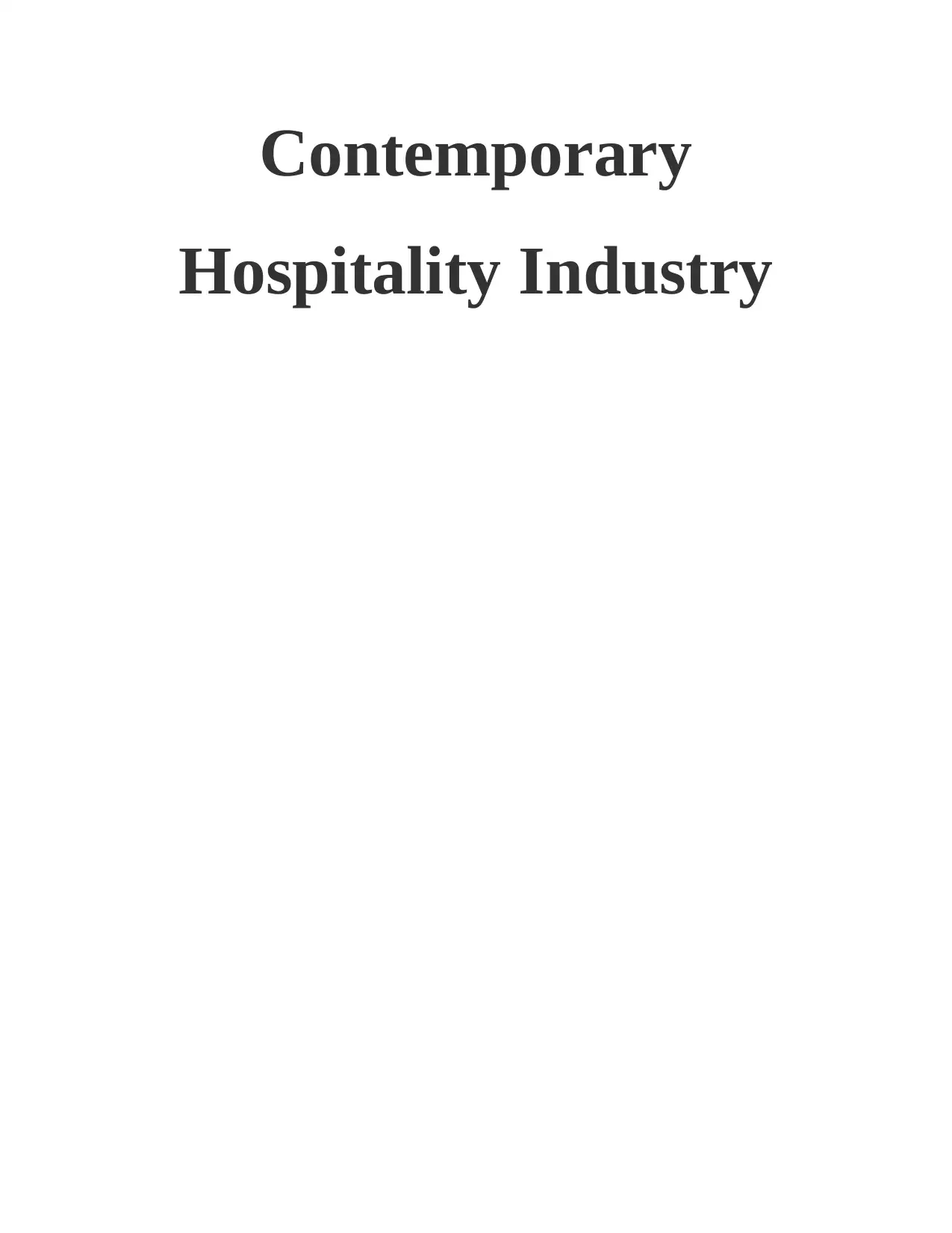
Contemporary
Hospitality Industry
Hospitality Industry
Paraphrase This Document
Need a fresh take? Get an instant paraphrase of this document with our AI Paraphraser
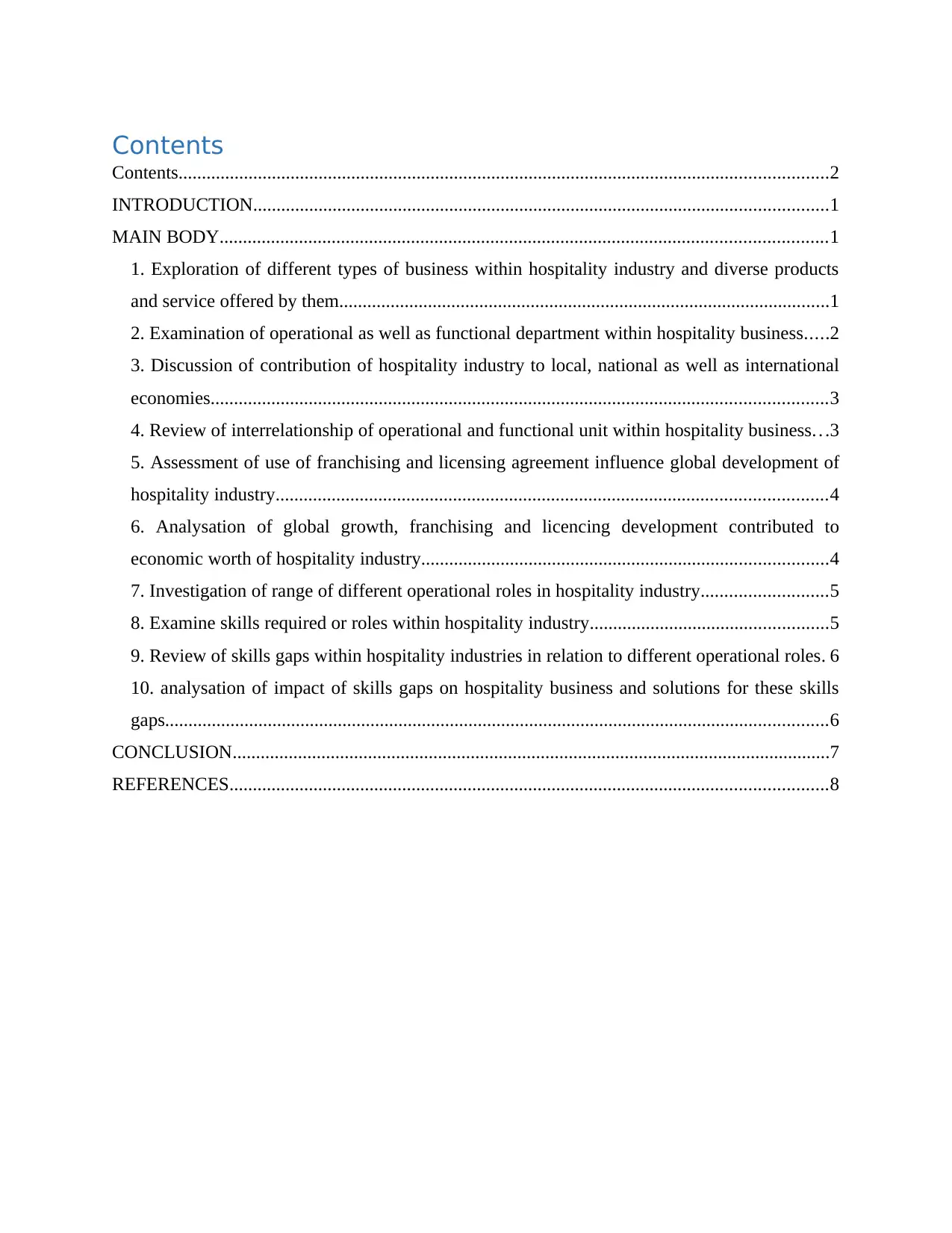
Contents
Contents...........................................................................................................................................2
INTRODUCTION...........................................................................................................................1
MAIN BODY..................................................................................................................................1
1. Exploration of different types of business within hospitality industry and diverse products
and service offered by them.........................................................................................................1
2. Examination of operational as well as functional department within hospitality business.....2
3. Discussion of contribution of hospitality industry to local, national as well as international
economies....................................................................................................................................3
4. Review of interrelationship of operational and functional unit within hospitality business. . .3
5. Assessment of use of franchising and licensing agreement influence global development of
hospitality industry......................................................................................................................4
6. Analysation of global growth, franchising and licencing development contributed to
economic worth of hospitality industry.......................................................................................4
7. Investigation of range of different operational roles in hospitality industry...........................5
8. Examine skills required or roles within hospitality industry...................................................5
9. Review of skills gaps within hospitality industries in relation to different operational roles. 6
10. analysation of impact of skills gaps on hospitality business and solutions for these skills
gaps..............................................................................................................................................6
CONCLUSION................................................................................................................................7
REFERENCES................................................................................................................................8
Contents...........................................................................................................................................2
INTRODUCTION...........................................................................................................................1
MAIN BODY..................................................................................................................................1
1. Exploration of different types of business within hospitality industry and diverse products
and service offered by them.........................................................................................................1
2. Examination of operational as well as functional department within hospitality business.....2
3. Discussion of contribution of hospitality industry to local, national as well as international
economies....................................................................................................................................3
4. Review of interrelationship of operational and functional unit within hospitality business. . .3
5. Assessment of use of franchising and licensing agreement influence global development of
hospitality industry......................................................................................................................4
6. Analysation of global growth, franchising and licencing development contributed to
economic worth of hospitality industry.......................................................................................4
7. Investigation of range of different operational roles in hospitality industry...........................5
8. Examine skills required or roles within hospitality industry...................................................5
9. Review of skills gaps within hospitality industries in relation to different operational roles. 6
10. analysation of impact of skills gaps on hospitality business and solutions for these skills
gaps..............................................................................................................................................6
CONCLUSION................................................................................................................................7
REFERENCES................................................................................................................................8
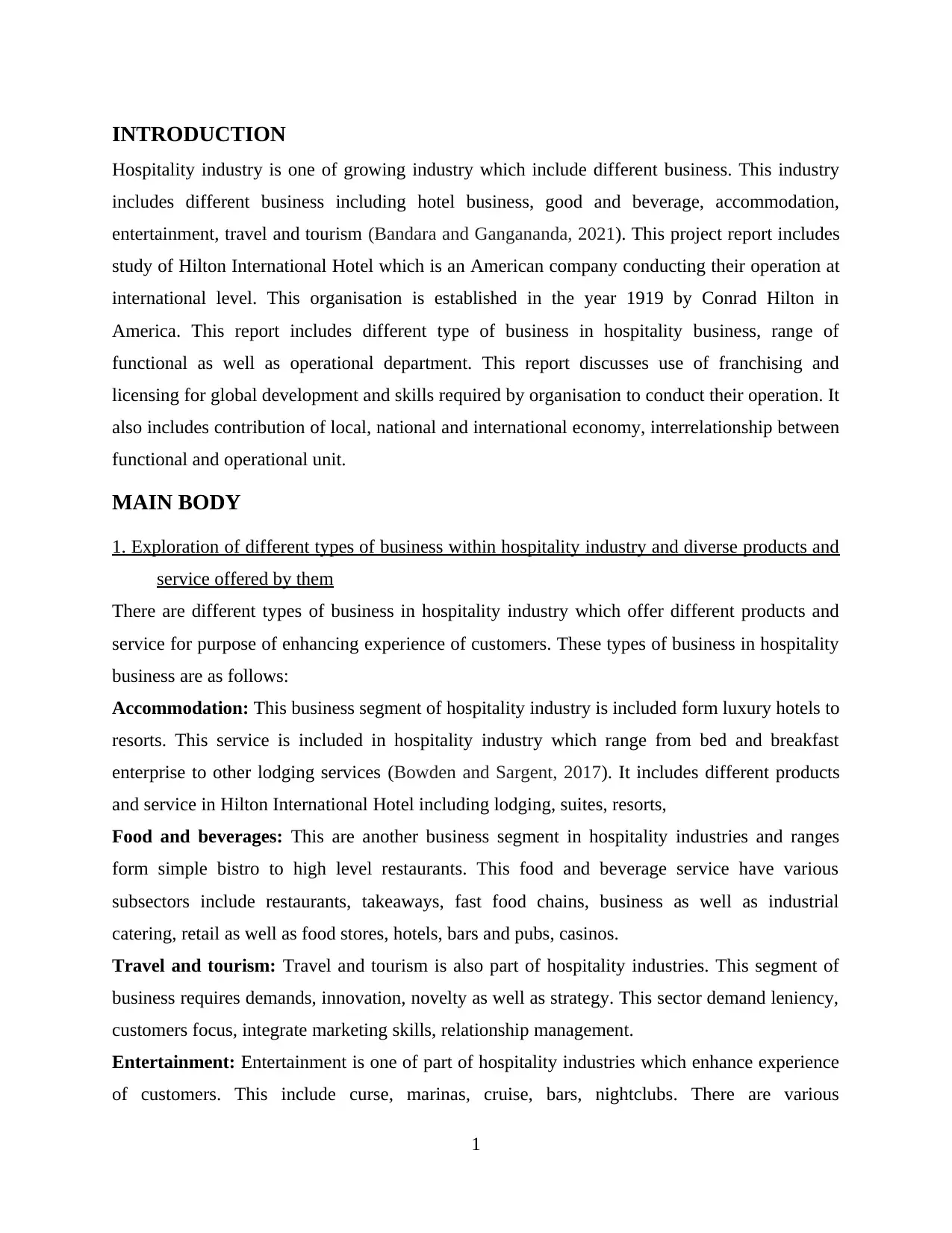
INTRODUCTION
Hospitality industry is one of growing industry which include different business. This industry
includes different business including hotel business, good and beverage, accommodation,
entertainment, travel and tourism (Bandara and Gangananda, 2021). This project report includes
study of Hilton International Hotel which is an American company conducting their operation at
international level. This organisation is established in the year 1919 by Conrad Hilton in
America. This report includes different type of business in hospitality business, range of
functional as well as operational department. This report discusses use of franchising and
licensing for global development and skills required by organisation to conduct their operation. It
also includes contribution of local, national and international economy, interrelationship between
functional and operational unit.
MAIN BODY
1. Exploration of different types of business within hospitality industry and diverse products and
service offered by them
There are different types of business in hospitality industry which offer different products and
service for purpose of enhancing experience of customers. These types of business in hospitality
business are as follows:
Accommodation: This business segment of hospitality industry is included form luxury hotels to
resorts. This service is included in hospitality industry which range from bed and breakfast
enterprise to other lodging services (Bowden and Sargent, 2017). It includes different products
and service in Hilton International Hotel including lodging, suites, resorts,
Food and beverages: This are another business segment in hospitality industries and ranges
form simple bistro to high level restaurants. This food and beverage service have various
subsectors include restaurants, takeaways, fast food chains, business as well as industrial
catering, retail as well as food stores, hotels, bars and pubs, casinos.
Travel and tourism: Travel and tourism is also part of hospitality industries. This segment of
business requires demands, innovation, novelty as well as strategy. This sector demand leniency,
customers focus, integrate marketing skills, relationship management.
Entertainment: Entertainment is one of part of hospitality industries which enhance experience
of customers. This include curse, marinas, cruise, bars, nightclubs. There are various
1
Hospitality industry is one of growing industry which include different business. This industry
includes different business including hotel business, good and beverage, accommodation,
entertainment, travel and tourism (Bandara and Gangananda, 2021). This project report includes
study of Hilton International Hotel which is an American company conducting their operation at
international level. This organisation is established in the year 1919 by Conrad Hilton in
America. This report includes different type of business in hospitality business, range of
functional as well as operational department. This report discusses use of franchising and
licensing for global development and skills required by organisation to conduct their operation. It
also includes contribution of local, national and international economy, interrelationship between
functional and operational unit.
MAIN BODY
1. Exploration of different types of business within hospitality industry and diverse products and
service offered by them
There are different types of business in hospitality industry which offer different products and
service for purpose of enhancing experience of customers. These types of business in hospitality
business are as follows:
Accommodation: This business segment of hospitality industry is included form luxury hotels to
resorts. This service is included in hospitality industry which range from bed and breakfast
enterprise to other lodging services (Bowden and Sargent, 2017). It includes different products
and service in Hilton International Hotel including lodging, suites, resorts,
Food and beverages: This are another business segment in hospitality industries and ranges
form simple bistro to high level restaurants. This food and beverage service have various
subsectors include restaurants, takeaways, fast food chains, business as well as industrial
catering, retail as well as food stores, hotels, bars and pubs, casinos.
Travel and tourism: Travel and tourism is also part of hospitality industries. This segment of
business requires demands, innovation, novelty as well as strategy. This sector demand leniency,
customers focus, integrate marketing skills, relationship management.
Entertainment: Entertainment is one of part of hospitality industries which enhance experience
of customers. This include curse, marinas, cruise, bars, nightclubs. There are various
1
⊘ This is a preview!⊘
Do you want full access?
Subscribe today to unlock all pages.

Trusted by 1+ million students worldwide
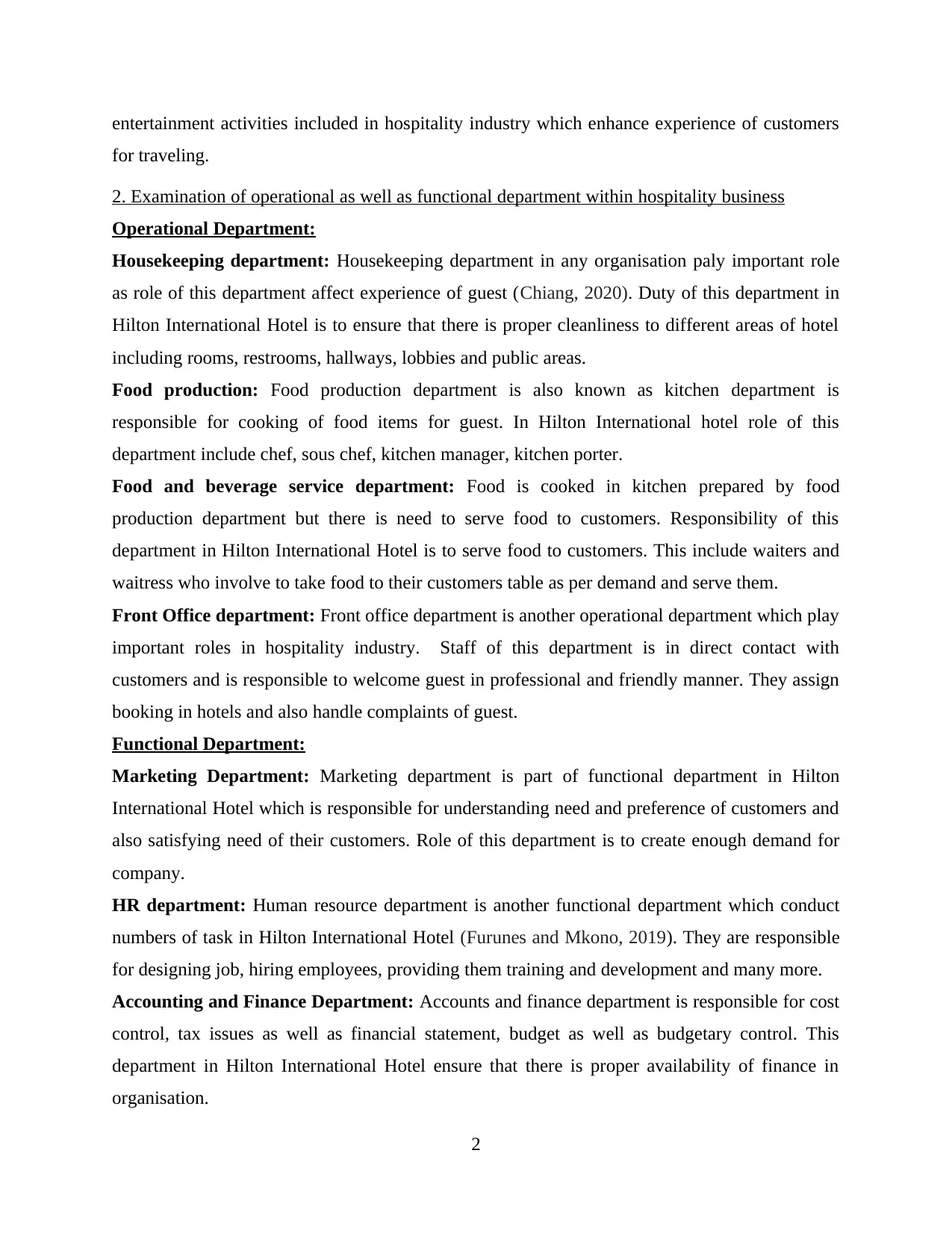
entertainment activities included in hospitality industry which enhance experience of customers
for traveling.
2. Examination of operational as well as functional department within hospitality business
Operational Department:
Housekeeping department: Housekeeping department in any organisation paly important role
as role of this department affect experience of guest (Chiang, 2020). Duty of this department in
Hilton International Hotel is to ensure that there is proper cleanliness to different areas of hotel
including rooms, restrooms, hallways, lobbies and public areas.
Food production: Food production department is also known as kitchen department is
responsible for cooking of food items for guest. In Hilton International hotel role of this
department include chef, sous chef, kitchen manager, kitchen porter.
Food and beverage service department: Food is cooked in kitchen prepared by food
production department but there is need to serve food to customers. Responsibility of this
department in Hilton International Hotel is to serve food to customers. This include waiters and
waitress who involve to take food to their customers table as per demand and serve them.
Front Office department: Front office department is another operational department which play
important roles in hospitality industry. Staff of this department is in direct contact with
customers and is responsible to welcome guest in professional and friendly manner. They assign
booking in hotels and also handle complaints of guest.
Functional Department:
Marketing Department: Marketing department is part of functional department in Hilton
International Hotel which is responsible for understanding need and preference of customers and
also satisfying need of their customers. Role of this department is to create enough demand for
company.
HR department: Human resource department is another functional department which conduct
numbers of task in Hilton International Hotel (Furunes and Mkono, 2019). They are responsible
for designing job, hiring employees, providing them training and development and many more.
Accounting and Finance Department: Accounts and finance department is responsible for cost
control, tax issues as well as financial statement, budget as well as budgetary control. This
department in Hilton International Hotel ensure that there is proper availability of finance in
organisation.
2
for traveling.
2. Examination of operational as well as functional department within hospitality business
Operational Department:
Housekeeping department: Housekeeping department in any organisation paly important role
as role of this department affect experience of guest (Chiang, 2020). Duty of this department in
Hilton International Hotel is to ensure that there is proper cleanliness to different areas of hotel
including rooms, restrooms, hallways, lobbies and public areas.
Food production: Food production department is also known as kitchen department is
responsible for cooking of food items for guest. In Hilton International hotel role of this
department include chef, sous chef, kitchen manager, kitchen porter.
Food and beverage service department: Food is cooked in kitchen prepared by food
production department but there is need to serve food to customers. Responsibility of this
department in Hilton International Hotel is to serve food to customers. This include waiters and
waitress who involve to take food to their customers table as per demand and serve them.
Front Office department: Front office department is another operational department which play
important roles in hospitality industry. Staff of this department is in direct contact with
customers and is responsible to welcome guest in professional and friendly manner. They assign
booking in hotels and also handle complaints of guest.
Functional Department:
Marketing Department: Marketing department is part of functional department in Hilton
International Hotel which is responsible for understanding need and preference of customers and
also satisfying need of their customers. Role of this department is to create enough demand for
company.
HR department: Human resource department is another functional department which conduct
numbers of task in Hilton International Hotel (Furunes and Mkono, 2019). They are responsible
for designing job, hiring employees, providing them training and development and many more.
Accounting and Finance Department: Accounts and finance department is responsible for cost
control, tax issues as well as financial statement, budget as well as budgetary control. This
department in Hilton International Hotel ensure that there is proper availability of finance in
organisation.
2
Paraphrase This Document
Need a fresh take? Get an instant paraphrase of this document with our AI Paraphraser
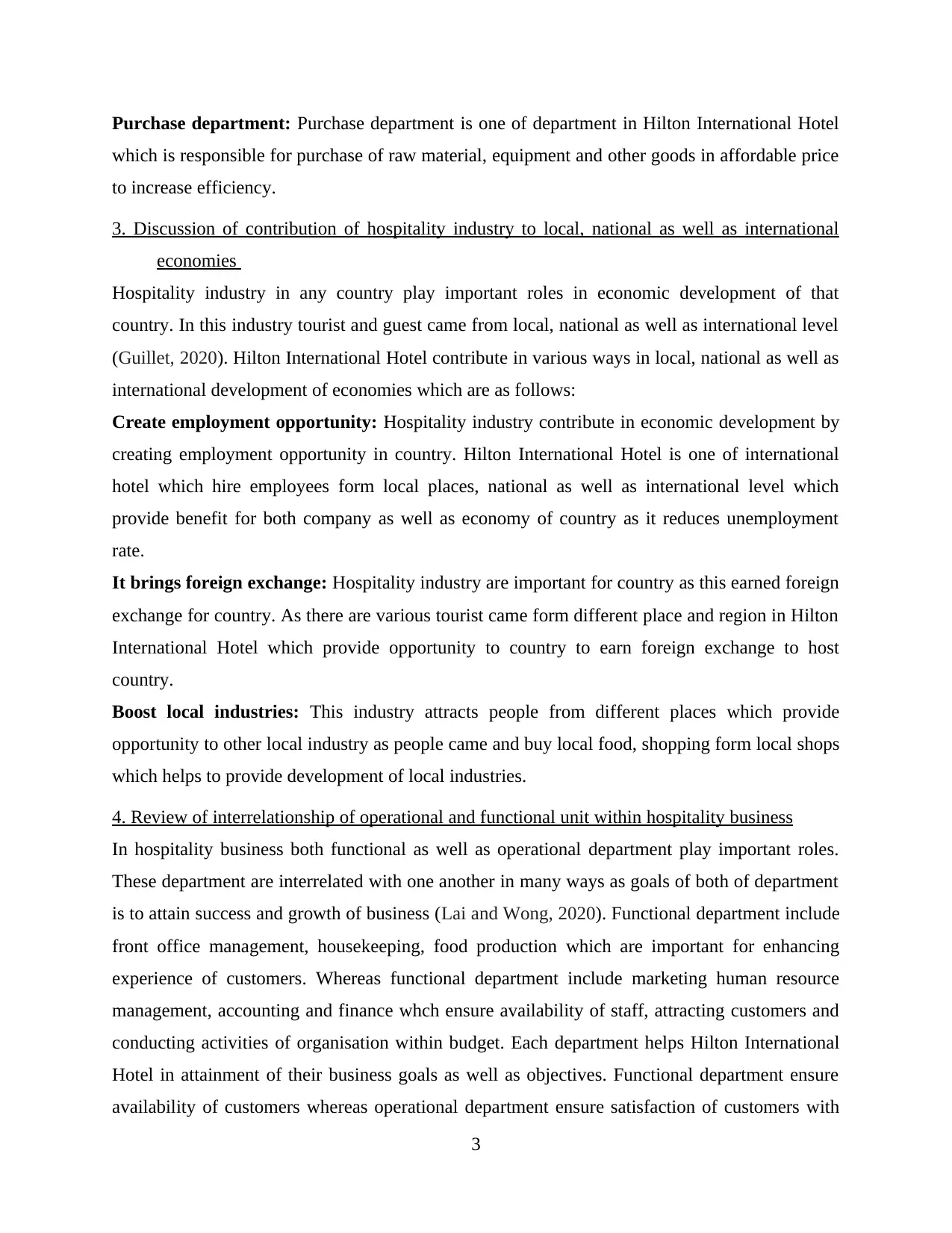
Purchase department: Purchase department is one of department in Hilton International Hotel
which is responsible for purchase of raw material, equipment and other goods in affordable price
to increase efficiency.
3. Discussion of contribution of hospitality industry to local, national as well as international
economies
Hospitality industry in any country play important roles in economic development of that
country. In this industry tourist and guest came from local, national as well as international level
(Guillet, 2020). Hilton International Hotel contribute in various ways in local, national as well as
international development of economies which are as follows:
Create employment opportunity: Hospitality industry contribute in economic development by
creating employment opportunity in country. Hilton International Hotel is one of international
hotel which hire employees form local places, national as well as international level which
provide benefit for both company as well as economy of country as it reduces unemployment
rate.
It brings foreign exchange: Hospitality industry are important for country as this earned foreign
exchange for country. As there are various tourist came form different place and region in Hilton
International Hotel which provide opportunity to country to earn foreign exchange to host
country.
Boost local industries: This industry attracts people from different places which provide
opportunity to other local industry as people came and buy local food, shopping form local shops
which helps to provide development of local industries.
4. Review of interrelationship of operational and functional unit within hospitality business
In hospitality business both functional as well as operational department play important roles.
These department are interrelated with one another in many ways as goals of both of department
is to attain success and growth of business (Lai and Wong, 2020). Functional department include
front office management, housekeeping, food production which are important for enhancing
experience of customers. Whereas functional department include marketing human resource
management, accounting and finance whch ensure availability of staff, attracting customers and
conducting activities of organisation within budget. Each department helps Hilton International
Hotel in attainment of their business goals as well as objectives. Functional department ensure
availability of customers whereas operational department ensure satisfaction of customers with
3
which is responsible for purchase of raw material, equipment and other goods in affordable price
to increase efficiency.
3. Discussion of contribution of hospitality industry to local, national as well as international
economies
Hospitality industry in any country play important roles in economic development of that
country. In this industry tourist and guest came from local, national as well as international level
(Guillet, 2020). Hilton International Hotel contribute in various ways in local, national as well as
international development of economies which are as follows:
Create employment opportunity: Hospitality industry contribute in economic development by
creating employment opportunity in country. Hilton International Hotel is one of international
hotel which hire employees form local places, national as well as international level which
provide benefit for both company as well as economy of country as it reduces unemployment
rate.
It brings foreign exchange: Hospitality industry are important for country as this earned foreign
exchange for country. As there are various tourist came form different place and region in Hilton
International Hotel which provide opportunity to country to earn foreign exchange to host
country.
Boost local industries: This industry attracts people from different places which provide
opportunity to other local industry as people came and buy local food, shopping form local shops
which helps to provide development of local industries.
4. Review of interrelationship of operational and functional unit within hospitality business
In hospitality business both functional as well as operational department play important roles.
These department are interrelated with one another in many ways as goals of both of department
is to attain success and growth of business (Lai and Wong, 2020). Functional department include
front office management, housekeeping, food production which are important for enhancing
experience of customers. Whereas functional department include marketing human resource
management, accounting and finance whch ensure availability of staff, attracting customers and
conducting activities of organisation within budget. Each department helps Hilton International
Hotel in attainment of their business goals as well as objectives. Functional department ensure
availability of customers whereas operational department ensure satisfaction of customers with
3
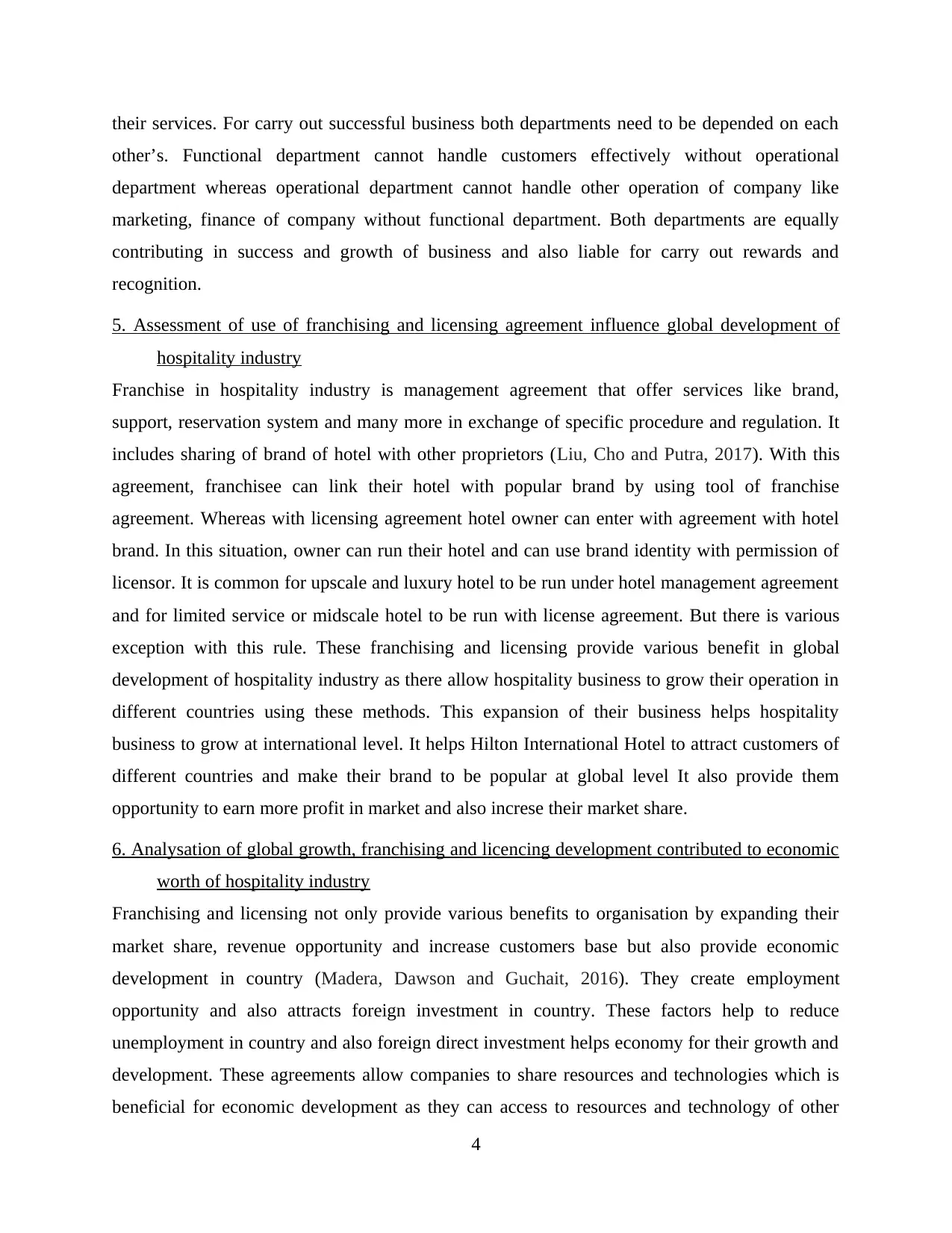
their services. For carry out successful business both departments need to be depended on each
other’s. Functional department cannot handle customers effectively without operational
department whereas operational department cannot handle other operation of company like
marketing, finance of company without functional department. Both departments are equally
contributing in success and growth of business and also liable for carry out rewards and
recognition.
5. Assessment of use of franchising and licensing agreement influence global development of
hospitality industry
Franchise in hospitality industry is management agreement that offer services like brand,
support, reservation system and many more in exchange of specific procedure and regulation. It
includes sharing of brand of hotel with other proprietors (Liu, Cho and Putra, 2017). With this
agreement, franchisee can link their hotel with popular brand by using tool of franchise
agreement. Whereas with licensing agreement hotel owner can enter with agreement with hotel
brand. In this situation, owner can run their hotel and can use brand identity with permission of
licensor. It is common for upscale and luxury hotel to be run under hotel management agreement
and for limited service or midscale hotel to be run with license agreement. But there is various
exception with this rule. These franchising and licensing provide various benefit in global
development of hospitality industry as there allow hospitality business to grow their operation in
different countries using these methods. This expansion of their business helps hospitality
business to grow at international level. It helps Hilton International Hotel to attract customers of
different countries and make their brand to be popular at global level It also provide them
opportunity to earn more profit in market and also increse their market share.
6. Analysation of global growth, franchising and licencing development contributed to economic
worth of hospitality industry
Franchising and licensing not only provide various benefits to organisation by expanding their
market share, revenue opportunity and increase customers base but also provide economic
development in country (Madera, Dawson and Guchait, 2016). They create employment
opportunity and also attracts foreign investment in country. These factors help to reduce
unemployment in country and also foreign direct investment helps economy for their growth and
development. These agreements allow companies to share resources and technologies which is
beneficial for economic development as they can access to resources and technology of other
4
other’s. Functional department cannot handle customers effectively without operational
department whereas operational department cannot handle other operation of company like
marketing, finance of company without functional department. Both departments are equally
contributing in success and growth of business and also liable for carry out rewards and
recognition.
5. Assessment of use of franchising and licensing agreement influence global development of
hospitality industry
Franchise in hospitality industry is management agreement that offer services like brand,
support, reservation system and many more in exchange of specific procedure and regulation. It
includes sharing of brand of hotel with other proprietors (Liu, Cho and Putra, 2017). With this
agreement, franchisee can link their hotel with popular brand by using tool of franchise
agreement. Whereas with licensing agreement hotel owner can enter with agreement with hotel
brand. In this situation, owner can run their hotel and can use brand identity with permission of
licensor. It is common for upscale and luxury hotel to be run under hotel management agreement
and for limited service or midscale hotel to be run with license agreement. But there is various
exception with this rule. These franchising and licensing provide various benefit in global
development of hospitality industry as there allow hospitality business to grow their operation in
different countries using these methods. This expansion of their business helps hospitality
business to grow at international level. It helps Hilton International Hotel to attract customers of
different countries and make their brand to be popular at global level It also provide them
opportunity to earn more profit in market and also increse their market share.
6. Analysation of global growth, franchising and licencing development contributed to economic
worth of hospitality industry
Franchising and licensing not only provide various benefits to organisation by expanding their
market share, revenue opportunity and increase customers base but also provide economic
development in country (Madera, Dawson and Guchait, 2016). They create employment
opportunity and also attracts foreign investment in country. These factors help to reduce
unemployment in country and also foreign direct investment helps economy for their growth and
development. These agreements allow companies to share resources and technologies which is
beneficial for economic development as they can access to resources and technology of other
4
⊘ This is a preview!⊘
Do you want full access?
Subscribe today to unlock all pages.

Trusted by 1+ million students worldwide
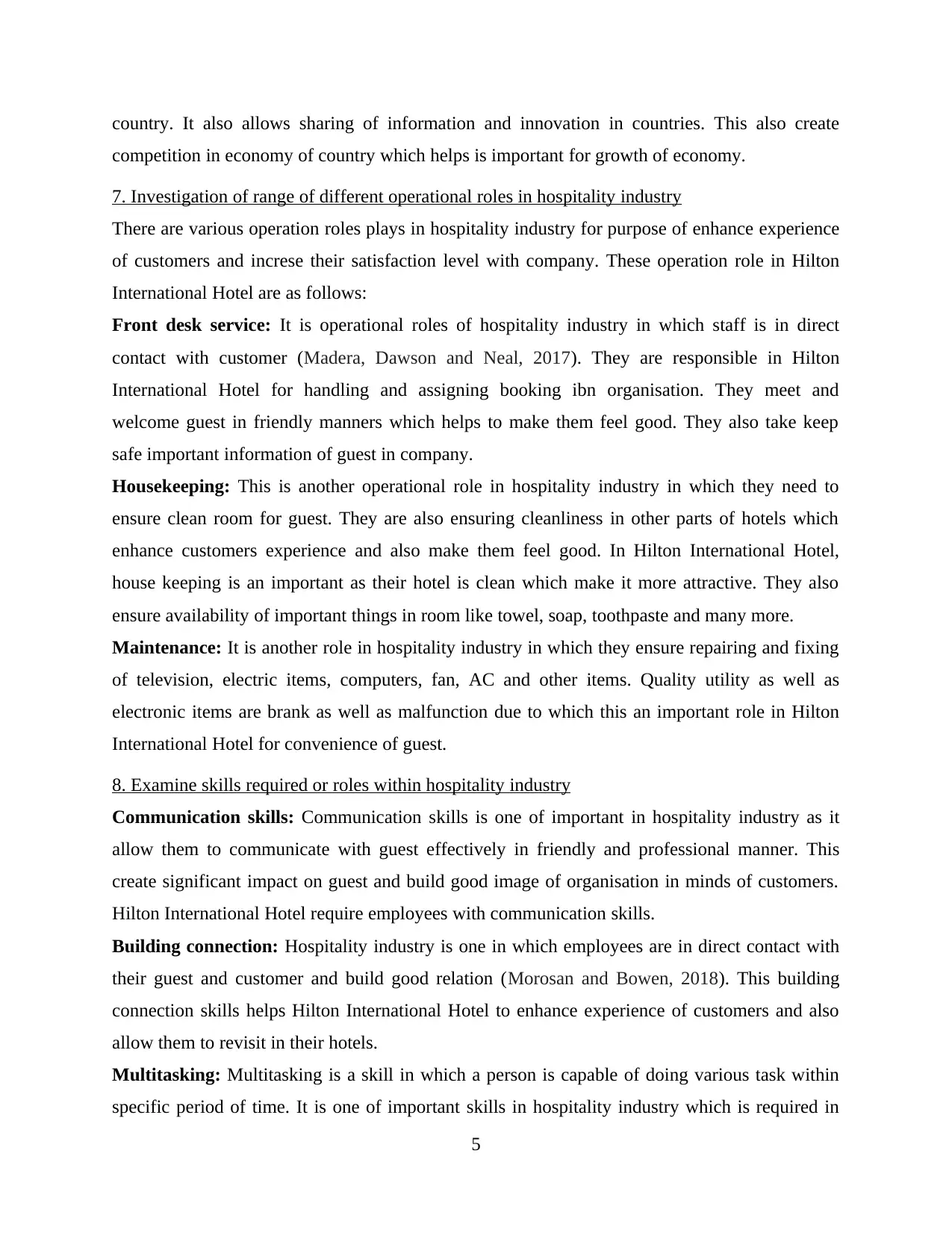
country. It also allows sharing of information and innovation in countries. This also create
competition in economy of country which helps is important for growth of economy.
7. Investigation of range of different operational roles in hospitality industry
There are various operation roles plays in hospitality industry for purpose of enhance experience
of customers and increse their satisfaction level with company. These operation role in Hilton
International Hotel are as follows:
Front desk service: It is operational roles of hospitality industry in which staff is in direct
contact with customer (Madera, Dawson and Neal, 2017). They are responsible in Hilton
International Hotel for handling and assigning booking ibn organisation. They meet and
welcome guest in friendly manners which helps to make them feel good. They also take keep
safe important information of guest in company.
Housekeeping: This is another operational role in hospitality industry in which they need to
ensure clean room for guest. They are also ensuring cleanliness in other parts of hotels which
enhance customers experience and also make them feel good. In Hilton International Hotel,
house keeping is an important as their hotel is clean which make it more attractive. They also
ensure availability of important things in room like towel, soap, toothpaste and many more.
Maintenance: It is another role in hospitality industry in which they ensure repairing and fixing
of television, electric items, computers, fan, AC and other items. Quality utility as well as
electronic items are brank as well as malfunction due to which this an important role in Hilton
International Hotel for convenience of guest.
8. Examine skills required or roles within hospitality industry
Communication skills: Communication skills is one of important in hospitality industry as it
allow them to communicate with guest effectively in friendly and professional manner. This
create significant impact on guest and build good image of organisation in minds of customers.
Hilton International Hotel require employees with communication skills.
Building connection: Hospitality industry is one in which employees are in direct contact with
their guest and customer and build good relation (Morosan and Bowen, 2018). This building
connection skills helps Hilton International Hotel to enhance experience of customers and also
allow them to revisit in their hotels.
Multitasking: Multitasking is a skill in which a person is capable of doing various task within
specific period of time. It is one of important skills in hospitality industry which is required in
5
competition in economy of country which helps is important for growth of economy.
7. Investigation of range of different operational roles in hospitality industry
There are various operation roles plays in hospitality industry for purpose of enhance experience
of customers and increse their satisfaction level with company. These operation role in Hilton
International Hotel are as follows:
Front desk service: It is operational roles of hospitality industry in which staff is in direct
contact with customer (Madera, Dawson and Neal, 2017). They are responsible in Hilton
International Hotel for handling and assigning booking ibn organisation. They meet and
welcome guest in friendly manners which helps to make them feel good. They also take keep
safe important information of guest in company.
Housekeeping: This is another operational role in hospitality industry in which they need to
ensure clean room for guest. They are also ensuring cleanliness in other parts of hotels which
enhance customers experience and also make them feel good. In Hilton International Hotel,
house keeping is an important as their hotel is clean which make it more attractive. They also
ensure availability of important things in room like towel, soap, toothpaste and many more.
Maintenance: It is another role in hospitality industry in which they ensure repairing and fixing
of television, electric items, computers, fan, AC and other items. Quality utility as well as
electronic items are brank as well as malfunction due to which this an important role in Hilton
International Hotel for convenience of guest.
8. Examine skills required or roles within hospitality industry
Communication skills: Communication skills is one of important in hospitality industry as it
allow them to communicate with guest effectively in friendly and professional manner. This
create significant impact on guest and build good image of organisation in minds of customers.
Hilton International Hotel require employees with communication skills.
Building connection: Hospitality industry is one in which employees are in direct contact with
their guest and customer and build good relation (Morosan and Bowen, 2018). This building
connection skills helps Hilton International Hotel to enhance experience of customers and also
allow them to revisit in their hotels.
Multitasking: Multitasking is a skill in which a person is capable of doing various task within
specific period of time. It is one of important skills in hospitality industry which is required in
5
Paraphrase This Document
Need a fresh take? Get an instant paraphrase of this document with our AI Paraphraser
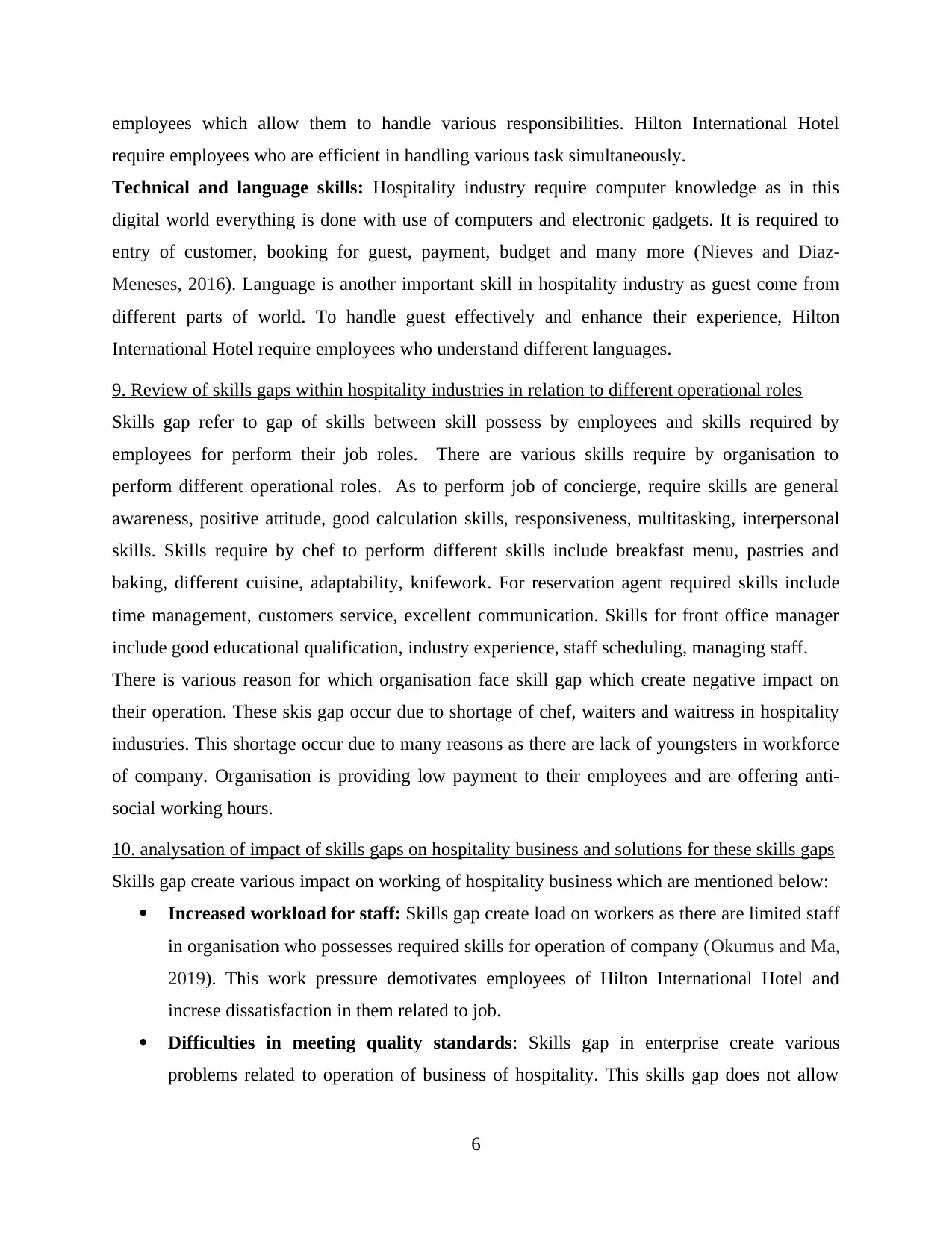
employees which allow them to handle various responsibilities. Hilton International Hotel
require employees who are efficient in handling various task simultaneously.
Technical and language skills: Hospitality industry require computer knowledge as in this
digital world everything is done with use of computers and electronic gadgets. It is required to
entry of customer, booking for guest, payment, budget and many more (Nieves and Diaz-
Meneses, 2016). Language is another important skill in hospitality industry as guest come from
different parts of world. To handle guest effectively and enhance their experience, Hilton
International Hotel require employees who understand different languages.
9. Review of skills gaps within hospitality industries in relation to different operational roles
Skills gap refer to gap of skills between skill possess by employees and skills required by
employees for perform their job roles. There are various skills require by organisation to
perform different operational roles. As to perform job of concierge, require skills are general
awareness, positive attitude, good calculation skills, responsiveness, multitasking, interpersonal
skills. Skills require by chef to perform different skills include breakfast menu, pastries and
baking, different cuisine, adaptability, knifework. For reservation agent required skills include
time management, customers service, excellent communication. Skills for front office manager
include good educational qualification, industry experience, staff scheduling, managing staff.
There is various reason for which organisation face skill gap which create negative impact on
their operation. These skis gap occur due to shortage of chef, waiters and waitress in hospitality
industries. This shortage occur due to many reasons as there are lack of youngsters in workforce
of company. Organisation is providing low payment to their employees and are offering anti-
social working hours.
10. analysation of impact of skills gaps on hospitality business and solutions for these skills gaps
Skills gap create various impact on working of hospitality business which are mentioned below:
Increased workload for staff: Skills gap create load on workers as there are limited staff
in organisation who possesses required skills for operation of company (Okumus and Ma,
2019). This work pressure demotivates employees of Hilton International Hotel and
increse dissatisfaction in them related to job.
Difficulties in meeting quality standards: Skills gap in enterprise create various
problems related to operation of business of hospitality. This skills gap does not allow
6
require employees who are efficient in handling various task simultaneously.
Technical and language skills: Hospitality industry require computer knowledge as in this
digital world everything is done with use of computers and electronic gadgets. It is required to
entry of customer, booking for guest, payment, budget and many more (Nieves and Diaz-
Meneses, 2016). Language is another important skill in hospitality industry as guest come from
different parts of world. To handle guest effectively and enhance their experience, Hilton
International Hotel require employees who understand different languages.
9. Review of skills gaps within hospitality industries in relation to different operational roles
Skills gap refer to gap of skills between skill possess by employees and skills required by
employees for perform their job roles. There are various skills require by organisation to
perform different operational roles. As to perform job of concierge, require skills are general
awareness, positive attitude, good calculation skills, responsiveness, multitasking, interpersonal
skills. Skills require by chef to perform different skills include breakfast menu, pastries and
baking, different cuisine, adaptability, knifework. For reservation agent required skills include
time management, customers service, excellent communication. Skills for front office manager
include good educational qualification, industry experience, staff scheduling, managing staff.
There is various reason for which organisation face skill gap which create negative impact on
their operation. These skis gap occur due to shortage of chef, waiters and waitress in hospitality
industries. This shortage occur due to many reasons as there are lack of youngsters in workforce
of company. Organisation is providing low payment to their employees and are offering anti-
social working hours.
10. analysation of impact of skills gaps on hospitality business and solutions for these skills gaps
Skills gap create various impact on working of hospitality business which are mentioned below:
Increased workload for staff: Skills gap create load on workers as there are limited staff
in organisation who possesses required skills for operation of company (Okumus and Ma,
2019). This work pressure demotivates employees of Hilton International Hotel and
increse dissatisfaction in them related to job.
Difficulties in meeting quality standards: Skills gap in enterprise create various
problems related to operation of business of hospitality. This skills gap does not allow
6
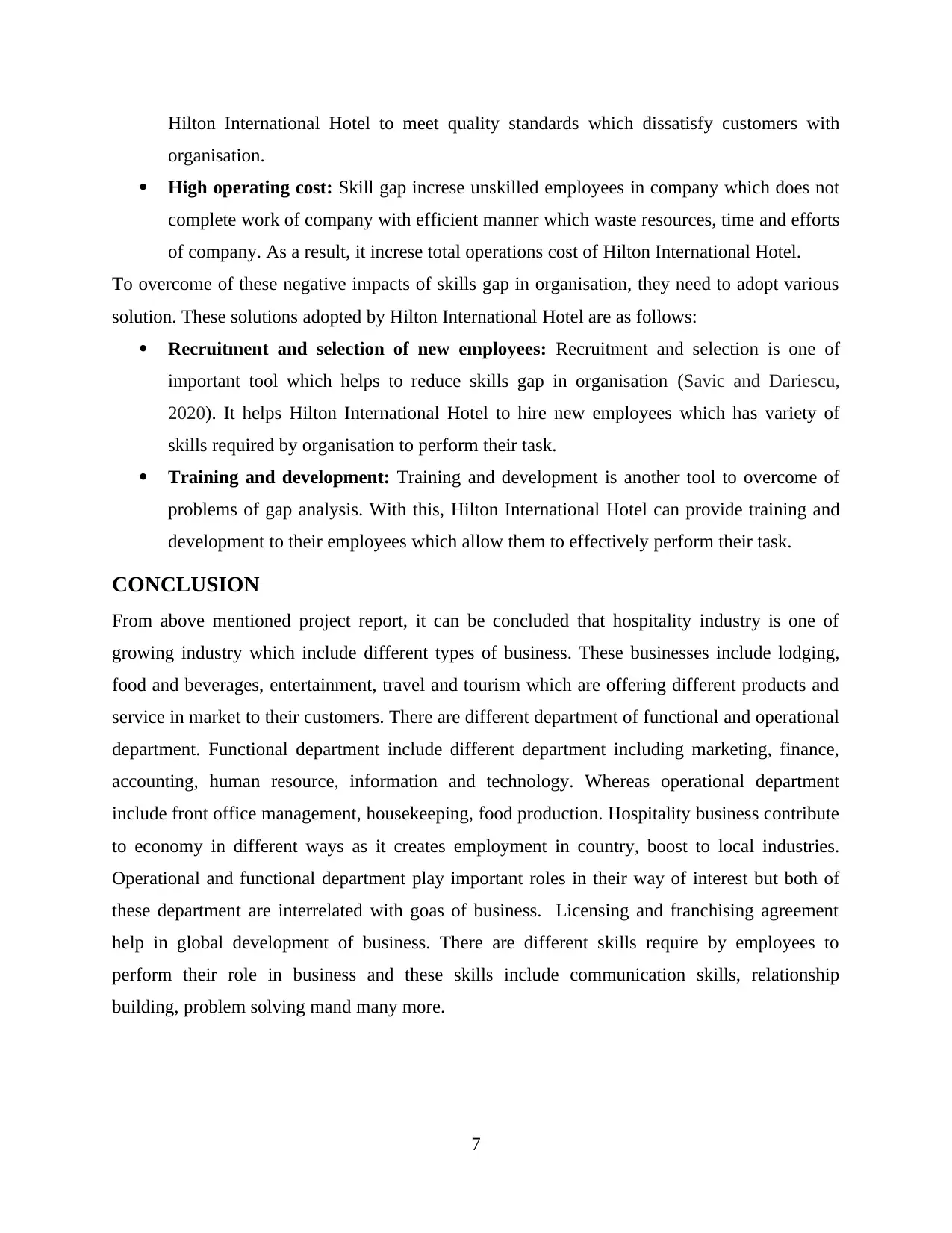
Hilton International Hotel to meet quality standards which dissatisfy customers with
organisation.
High operating cost: Skill gap increse unskilled employees in company which does not
complete work of company with efficient manner which waste resources, time and efforts
of company. As a result, it increse total operations cost of Hilton International Hotel.
To overcome of these negative impacts of skills gap in organisation, they need to adopt various
solution. These solutions adopted by Hilton International Hotel are as follows:
Recruitment and selection of new employees: Recruitment and selection is one of
important tool which helps to reduce skills gap in organisation (Savic and Dariescu,
2020). It helps Hilton International Hotel to hire new employees which has variety of
skills required by organisation to perform their task.
Training and development: Training and development is another tool to overcome of
problems of gap analysis. With this, Hilton International Hotel can provide training and
development to their employees which allow them to effectively perform their task.
CONCLUSION
From above mentioned project report, it can be concluded that hospitality industry is one of
growing industry which include different types of business. These businesses include lodging,
food and beverages, entertainment, travel and tourism which are offering different products and
service in market to their customers. There are different department of functional and operational
department. Functional department include different department including marketing, finance,
accounting, human resource, information and technology. Whereas operational department
include front office management, housekeeping, food production. Hospitality business contribute
to economy in different ways as it creates employment in country, boost to local industries.
Operational and functional department play important roles in their way of interest but both of
these department are interrelated with goas of business. Licensing and franchising agreement
help in global development of business. There are different skills require by employees to
perform their role in business and these skills include communication skills, relationship
building, problem solving mand many more.
7
organisation.
High operating cost: Skill gap increse unskilled employees in company which does not
complete work of company with efficient manner which waste resources, time and efforts
of company. As a result, it increse total operations cost of Hilton International Hotel.
To overcome of these negative impacts of skills gap in organisation, they need to adopt various
solution. These solutions adopted by Hilton International Hotel are as follows:
Recruitment and selection of new employees: Recruitment and selection is one of
important tool which helps to reduce skills gap in organisation (Savic and Dariescu,
2020). It helps Hilton International Hotel to hire new employees which has variety of
skills required by organisation to perform their task.
Training and development: Training and development is another tool to overcome of
problems of gap analysis. With this, Hilton International Hotel can provide training and
development to their employees which allow them to effectively perform their task.
CONCLUSION
From above mentioned project report, it can be concluded that hospitality industry is one of
growing industry which include different types of business. These businesses include lodging,
food and beverages, entertainment, travel and tourism which are offering different products and
service in market to their customers. There are different department of functional and operational
department. Functional department include different department including marketing, finance,
accounting, human resource, information and technology. Whereas operational department
include front office management, housekeeping, food production. Hospitality business contribute
to economy in different ways as it creates employment in country, boost to local industries.
Operational and functional department play important roles in their way of interest but both of
these department are interrelated with goas of business. Licensing and franchising agreement
help in global development of business. There are different skills require by employees to
perform their role in business and these skills include communication skills, relationship
building, problem solving mand many more.
7
⊘ This is a preview!⊘
Do you want full access?
Subscribe today to unlock all pages.

Trusted by 1+ million students worldwide
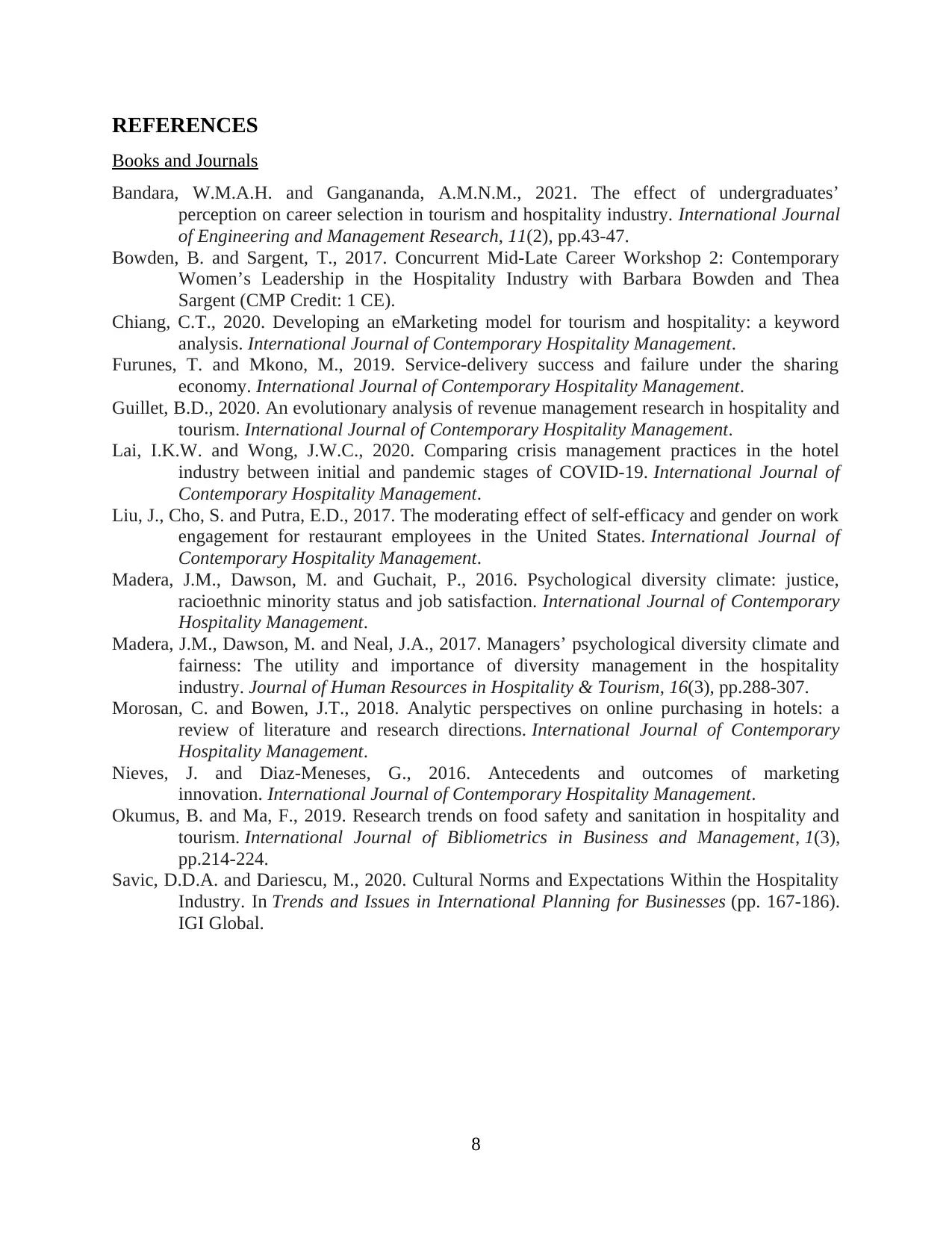
REFERENCES
Books and Journals
Bandara, W.M.A.H. and Gangananda, A.M.N.M., 2021. The effect of undergraduates’
perception on career selection in tourism and hospitality industry. International Journal
of Engineering and Management Research, 11(2), pp.43-47.
Bowden, B. and Sargent, T., 2017. Concurrent Mid-Late Career Workshop 2: Contemporary
Women’s Leadership in the Hospitality Industry with Barbara Bowden and Thea
Sargent (CMP Credit: 1 CE).
Chiang, C.T., 2020. Developing an eMarketing model for tourism and hospitality: a keyword
analysis. International Journal of Contemporary Hospitality Management.
Furunes, T. and Mkono, M., 2019. Service-delivery success and failure under the sharing
economy. International Journal of Contemporary Hospitality Management.
Guillet, B.D., 2020. An evolutionary analysis of revenue management research in hospitality and
tourism. International Journal of Contemporary Hospitality Management.
Lai, I.K.W. and Wong, J.W.C., 2020. Comparing crisis management practices in the hotel
industry between initial and pandemic stages of COVID-19. International Journal of
Contemporary Hospitality Management.
Liu, J., Cho, S. and Putra, E.D., 2017. The moderating effect of self-efficacy and gender on work
engagement for restaurant employees in the United States. International Journal of
Contemporary Hospitality Management.
Madera, J.M., Dawson, M. and Guchait, P., 2016. Psychological diversity climate: justice,
racioethnic minority status and job satisfaction. International Journal of Contemporary
Hospitality Management.
Madera, J.M., Dawson, M. and Neal, J.A., 2017. Managers’ psychological diversity climate and
fairness: The utility and importance of diversity management in the hospitality
industry. Journal of Human Resources in Hospitality & Tourism, 16(3), pp.288-307.
Morosan, C. and Bowen, J.T., 2018. Analytic perspectives on online purchasing in hotels: a
review of literature and research directions. International Journal of Contemporary
Hospitality Management.
Nieves, J. and Diaz-Meneses, G., 2016. Antecedents and outcomes of marketing
innovation. International Journal of Contemporary Hospitality Management.
Okumus, B. and Ma, F., 2019. Research trends on food safety and sanitation in hospitality and
tourism. International Journal of Bibliometrics in Business and Management, 1(3),
pp.214-224.
Savic, D.D.A. and Dariescu, M., 2020. Cultural Norms and Expectations Within the Hospitality
Industry. In Trends and Issues in International Planning for Businesses (pp. 167-186).
IGI Global.
8
Books and Journals
Bandara, W.M.A.H. and Gangananda, A.M.N.M., 2021. The effect of undergraduates’
perception on career selection in tourism and hospitality industry. International Journal
of Engineering and Management Research, 11(2), pp.43-47.
Bowden, B. and Sargent, T., 2017. Concurrent Mid-Late Career Workshop 2: Contemporary
Women’s Leadership in the Hospitality Industry with Barbara Bowden and Thea
Sargent (CMP Credit: 1 CE).
Chiang, C.T., 2020. Developing an eMarketing model for tourism and hospitality: a keyword
analysis. International Journal of Contemporary Hospitality Management.
Furunes, T. and Mkono, M., 2019. Service-delivery success and failure under the sharing
economy. International Journal of Contemporary Hospitality Management.
Guillet, B.D., 2020. An evolutionary analysis of revenue management research in hospitality and
tourism. International Journal of Contemporary Hospitality Management.
Lai, I.K.W. and Wong, J.W.C., 2020. Comparing crisis management practices in the hotel
industry between initial and pandemic stages of COVID-19. International Journal of
Contemporary Hospitality Management.
Liu, J., Cho, S. and Putra, E.D., 2017. The moderating effect of self-efficacy and gender on work
engagement for restaurant employees in the United States. International Journal of
Contemporary Hospitality Management.
Madera, J.M., Dawson, M. and Guchait, P., 2016. Psychological diversity climate: justice,
racioethnic minority status and job satisfaction. International Journal of Contemporary
Hospitality Management.
Madera, J.M., Dawson, M. and Neal, J.A., 2017. Managers’ psychological diversity climate and
fairness: The utility and importance of diversity management in the hospitality
industry. Journal of Human Resources in Hospitality & Tourism, 16(3), pp.288-307.
Morosan, C. and Bowen, J.T., 2018. Analytic perspectives on online purchasing in hotels: a
review of literature and research directions. International Journal of Contemporary
Hospitality Management.
Nieves, J. and Diaz-Meneses, G., 2016. Antecedents and outcomes of marketing
innovation. International Journal of Contemporary Hospitality Management.
Okumus, B. and Ma, F., 2019. Research trends on food safety and sanitation in hospitality and
tourism. International Journal of Bibliometrics in Business and Management, 1(3),
pp.214-224.
Savic, D.D.A. and Dariescu, M., 2020. Cultural Norms and Expectations Within the Hospitality
Industry. In Trends and Issues in International Planning for Businesses (pp. 167-186).
IGI Global.
8
1 out of 10
Related Documents
Your All-in-One AI-Powered Toolkit for Academic Success.
+13062052269
info@desklib.com
Available 24*7 on WhatsApp / Email
![[object Object]](/_next/static/media/star-bottom.7253800d.svg)
Unlock your academic potential
Copyright © 2020–2026 A2Z Services. All Rights Reserved. Developed and managed by ZUCOL.



